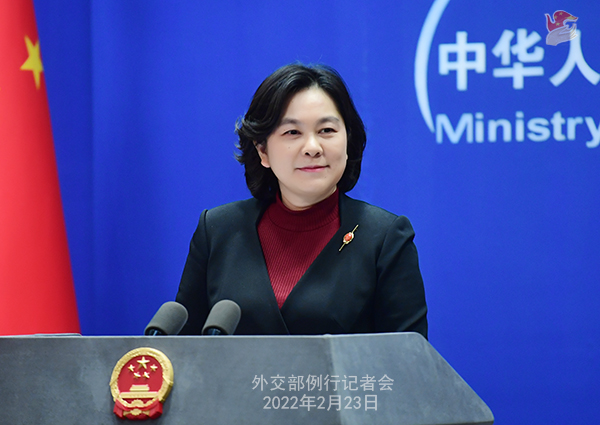
The Western Press is notoriously naive. That is its great utility to states that seek to use it as a means of projecting normative power. Even better, when it is not naive, it constitutes a an element of complicity in the political maneuverings of political factions to which it is attached in their projects of political advantage and control.But at times this is also the great strength of the press--it is best understood as a reflection of the state of political culture at any point in time when disaggregated, the 'press' is understood merely as the collective manifestation of the the individuals who mostly in good faith apply what they know and how they have been trained to the 'coverage' of events, and thus covered,managed. Press people mean well; it is just that they are people and thus factors in the production of and prisoners of the discursive and ideological cages within which and for which they operate. I this case a generation of cultural naval gazing has left the Western camp no longer able to connect the importance of the preservation of the global order to their own parochial needs.
And thus the endless discussion among people paid to deliver and analyze 'news' quizzing everyone they can with authority about "why should Americans care about whatever Russia does to Ukraine' " and the utter inability of the people (officials) questioned to provide a coherent much less compelling answer. The answer ought to be simple--those who inherited the mantle of leadership from the victorious allies after 1945 have a heavy responsibility to uphold the global system established to preserve the peace; its collapse will bring back the sort of instability and chaos that produced the bloody normal of the 20thcentury. OR: we made it, we own it, it has provided unparalleled benefit and a space to realize better the fruits of peace; we break it; we lose it; we descend back to a 'warring states' period the price of which will be measured in the coffins that must be buried as the price of sloth and dereliction of responsibility and in the destruction of the productive forces that have made generally moved global society forward.
 |
| Pix Credit HERE |
China rejected descriptions of Russia's ongoing military offensive in Ukraine as an "invasion" on Thursday while being pressed on its refusal to openly condemn Moscow's actions. . . . At a press conference in Beijing, China's Assistant Foreign Minister Hua Chunying took issue with what she called "typical Western framing" of the situation after a reporter had used the term "invasion." China would not "rush into a conclusion," she said. (China Refuses To Call Russia's War on Ukraine an 'Invasion')
China reiterated on Thursday a call for all parties involved in the situation in Ukraine to exercise restraint and rejected a foreign journalist's description of Russia's actions as an invasion. (China calls for restraint in Ukraine, rejects the term 'invasion')
The Ukraine-Russia crisis is posing a major challenge for China on many fronts.. . The Chinese government thinks it cannot be seen to support war in Europe but also wants to strengthen military and strategic ties with Moscow.. . Furthermore, a constant refrain from China's leaders is that it does not interfere in the internal affairs of others and that other countries should not interfere in its internal affairs.. . . On Weibo, China's version of Twitter, Chinese nationalists have used Russia's invasion of Ukraine to call on their own nation to follow suit with comments like: "It's the best chance to take Taiwan back now!" When the Chinese government rejected the imposition of sanctions on Russia in recent days it knew it could face similar treatment if it moves to seize Taiwan by force, in what would be a bloody, costly exercise. Foreign Ministry spokeswoman Hua Chunying told a regular press briefing in Beijing that China has never thought that sanctions were the best way to solve problems. (The Ukraine crisis is a major challenge for China)
She described Taiwan and Ukraine as "fundamentally different in terms of geostrategy, geographical environment, and the importance of international supply chains." "However, in the face of external forces attempting to manipulate the situation in Ukraine and affect the morale in Taiwan's society, all government units must be more vigilant against cognitive warfare."
It is possible to read the carefully crafted answers differently: China has taken the position that Ukraine is not Taiwan precisely because China's claim to Taiwan is infinitely stronger than Russia's claim to Ukraine. BUT, should Russia succeed in its military adventurism in Ukraine, it will suggest to China that it may be appropriate as well to bring forward considerably the time for taking military action to reclaim direct authority over Taiwan. It is the success of the violence rather than the comparison of the legitimacy of the basis for its use that is the critical center of the remarks.
The press sector lost in its definitional myopia and fearful of bearing witness fully to the consequences of the movement toward the collapse of the world order initiated through the UN system after 1945, might not wish to see this. But it is as likely that the Chinese are signalling an intention to reclaim by force Taiwan now based on Western responses (and their success) with respect to the much weaker claims of Russia to Ukraine. THAT, precisely, is the invitation the Chinese may see the international community making; depending on the outcome of the next several weeks. In its worst case scenario (or most ambitious case scenarios from the Chinese point of view) one might expect the potential for the realization of unification by violence to have become more likely either (1) before the summer (strike while the iron is hot camp)or (2) in October on the even of the US mid-term elections (apex of Western distraction and weakens is best camp)). Should Mr.Biden become ill, all timetables would be subject to change as would the calculus of risk-objectives.
But judge for yourselves. The text of Foreign Ministry Spokesperson Hua Chunying’s Regular Press Conference on February 23, 2022 follows below.
Foreign Ministry Spokesperson Hua Chunying’s Regular Press Conference on February 23, 2022

CCTV: On Ukraine, what role has China played in seeking a resolution to the Ukraine issue?
Hua Chunying: On regional hotspot issues, China is always committed to promoting peace and negotiation and playing a constructive role in seeking a peaceful resolution of these issues.
On the Ukraine issue, lately the US has been sending weapons to Ukraine, heightening tensions, creating panic and even hyping up the possibility of warfare. In stark contrast, China has all along called on all parties to respect and attach importance to each other’s legitimate security concerns, strive to resolve issues through negotiation and consultation, and jointly safeguard regional peace and stability. President Xi Jinping stressed in a telephone conversation with French President Emmanuel Macron on February 16 that relevant parties should stick to the general direction of political settlement, make full use of multilateral platforms including the Normandy format, and seek a comprehensive settlement of the Ukraine issue through dialogue and consultation. State Councilor and Foreign Minister Wang Yi also stressed while attending a special event on China during the 58th Munich Security Conference that all sides should earnestly assume their responsibility and work for peace instead of increasing tensions, stoking panic, or hyping up war.
A key question here is what role the US, the culprit of current tensions surrounding Ukraine, has played. If someone keeps pouring oil on the flame while accusing others of not doing their best to put out the fire, such kind of behavior is clearly irresponsible and immoral.
Phoenix TV: Spokesperson of the Taiwan region’s leader and the head of Taiwan’s foreign affairs department compared the Ukraine issue to the Taiwan question, and expressed the hope that the international community will continue to provide Taiwan with weapons so that China’s mainland dare not “invade” Taiwan by force. Some people also said that we should not make Ukraine’s today Taiwan’s tomorrow. Do you have any comment?
Hua Chunying: It is unwise of certain people of the Taiwan authorities to latch on to and exploit the Ukraine issue to their advantage.
Taiwan for sure is not Ukraine. Taiwan has always been an inalienable part of China’s territory. This is an indisputable historical and legal fact. The one-China principle is a universally recognized norm governing international relations. The Taiwan region’s peace hinges on the peaceful development of cross-Strait relations, rather than fawning on foreign forces for arms sales and military support. “Taiwan independence” only leads to a dead end. No one shall have any illusion or make any miscalculation on this issue.
Since the Ukraine crisis broke out, Taiwan has been frequently mentioned by some people. Some of their remarks fully reveal their lack of knowledge of the history of the Taiwan question. I’d like to take this occasion to share some basic facts with you.
It is common knowledge that the Taiwan question was caused by a civil war, and there is political confrontation between the two sides of the Taiwan Strait due to that civil war. However, China’s sovereignty and territory have never been divided and cannot be divided. This is the status quo of the Taiwan question.
This year marks the 50th anniversary of President Nixon’s visit to China. During that visit in February 1972, the two sides issued the China-US Joint Communiqué in Shanghai, marking the normalization of China-US relations. There are very important lines on the Taiwan question in the Shanghai Communiqué. The U.S. side stated: There are essential differences between China and the United States in their social systems and foreign policies. However, the two sides agreed that countries, regardless of their social systems, should conduct their relations on the principles of respect for the sovereignty and territorial integrity of all states, nonaggression against other states, noninterference in the internal affairs of other states, equality and mutual benefit, and peaceful coexistence. The U.S. side also declared: The United States acknowledges that all Chinese on either side of the Taiwan Strait maintain there is but one China and that Taiwan is a part of China. The United States Government does not challenge that position. It reaffirms its interest in a peaceful settlement of the Taiwan question by the Chinese themselves. With this prospect in mind, it affirms the ultimate objective of the withdrawal of all U.S. forces and military installations from Taiwan. In the meantime, it will progressively reduce its forces and military installations on Taiwan.
In the August 17 Communiqué issued by the Chinese and US governments in 1982, the US government stated that it attaches great importance to its relations with China, and reiterates that it has no intention of infringing on Chinese sovereignty and territorial integrity, or interfering in China’s internal affairs, or pursuing a policy of “two Chinas” or “one China, one Taiwan.” The United States Government states that it does not seek to carry out a long-term policy of arms sales to Taiwan, that its arms sales to Taiwan will not exceed, either in qualitative or in quantitative terms, the level of those supplied in recent years since the establishment of diplomatic relations between the United States and China, and that it intends gradually to reduce its sale of arms to Taiwan, leading, over a period of time, to a final resolution.
These are some historical facts that I’d like to take this opportunity to share with you about Taiwan and the relationship between the US and Taiwan, so you may have some idea as to whether the US honors its commitment or not. In the context of what’s happening now in the world, I believe this will help you to better understand the Taiwan question. On this issue, we would also like to advise certain people, including some on the Taiwan island, not to have any illusion or make any miscalculation on the Taiwan question.
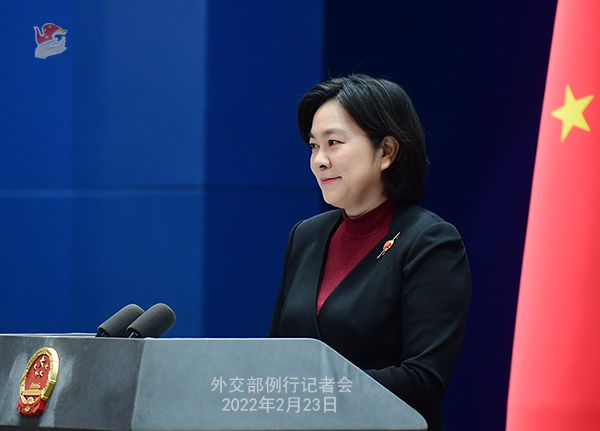
AFP: Multiple countries and organizations, including the US, the EU and the UK, have announced new sanctions against Russia for its actions toward Ukraine. Are there any circumstances whatsoever in which China would do the same?
Hua Chunying: Apparently you lack basic knowledge of the Chinese government’s policy. Our position is that sanctions are never fundamentally effective means to solve problems. We consistently oppose all illegal unilateral sanctions.
According to data released by the US Treasury, the US’ sanctions use has increased ten times over the past 20 years. The previous US administration made as many as 3,800 sanctions designations, which means wielding the stick of sanctions three times per day on average. Since 2011, the US has imposed more than 100 sanctions on Russia. However, have the US sanctions solved any problem? Is the world a better place because of those sanctions? Will the Ukraine issue resolve itself thanks to the US sanctions on Russia? Will European security be better guaranteed thanks to the US sanctions on Russia? We hope relevant sides will give this some serious thought and strive to resolve issues through dialogue and consultation.
I would also like to point out that the illegal unilateral sanctions by some countries including the US have caused severe difficulties to relevant countries’ economy and livelihood. When handling the Ukraine issue and relations with Russia, the US mustn’t harm the legitimate rights and interests of China and other parties.
China Daily: A few US media outlets believe that China’s remarks and position on Ukraine contradict the principle of respecting state sovereignty and territorial integrity that China always champions. Do you agree?
Hua Chunying: China’s position on the Ukraine issue is consistent and stays unchanged.
China’s remarks are in line with our position that regional hotspot issues should be resolved through dialogue and consultation. China always upholds objectivity and fairness, stands for peace and justice, and decides its position based on the merits of the matter concerned. We believe that all countries should settle international disputes in a peaceful way in accordance with the purposes and principles of the UN Charter. Those who accuse China of violating the principle of respecting state sovereignty and territorial integrity on the Ukraine issue either harbor ulterior motives or are misguided by misrepresentation.
Reason and causality are important when trying to understand things. There is a complex historical context on the Ukraine issue and the current situation is the result of the interplay of many complicated factors. In order to have an objective understanding of the situation and seek a reasonable and peaceful settlement, it is necessary to learn the whole story on the Ukraine issue and properly address each other’s legitimate security concerns on the basis of equality and mutual respect. Certain countries should ask themselves: When the US drove five waves of NATO expansion eastward all the way to Russia’s doorstep and deployed advanced offensive strategic weapons in breach of its assurances to Russia, did it ever think about the consequences of pushing a big country to the wall?
Under the current circumstances, the door to a peaceful settlement of the Ukraine issue is not completely shut. We hope relevant parties concerned can stay cool-headed and rational, and commit themselves to a peaceful resolution through negotiation in accordance with the purposes and principles of the UN Charter. China will continue to promote peace talks in its own way. We welcome and encourage all efforts dedicated to advancing diplomatic settlement of the issue.
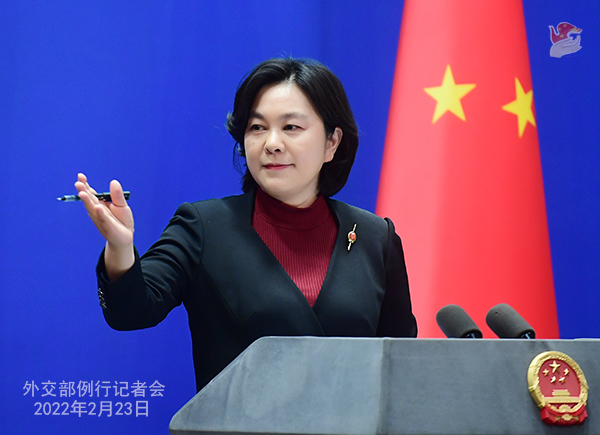
Beijing Youth Daily: According to reports, the International Atomic Energy Agency (IAEA) said its Task Force of experts has completed on-site visit to review the safety of Japan’s plan to dispose of nuclear-contaminated water from the Fukushima Daiichi Nuclear Power Station and will release a report on the mission in about two months’ time. What does China think of the mission? Will it maintain communication with the IAEA over the report to be released?
Hua Chunying: I noted relevant reports. Japan’s unilateral decision to discharge nuclear-contaminated water from Fukushima into the sea has been widely questioned and opposed by the international community, especially stakeholders. The IAEA Task Force has drawn much attention from various sides. It must be pointed out that the Japanese side didn’t agree to review by the Task Force of disposal means other than the ocean discharge option, which means that the IAEA was unable to review the optimal option. This is not the result the international community was expecting. China supports the Task Force in carrying out its work, but that does not mean we endorse Japan’s erroneous decision to release nuclear-contaminated water into the sea.
The disposal of the nuclear-contaminated water is not just a nuclear security issue, but could cause great harm to marine ecology, food safety and human health. China hopes that with the deepening of the Task Force’s work, Japan could be brought around to rectify its mistake and instead dispose of the nuclear-contaminated water in an open, transparent, science-based and safe manner through full consultation with relevant international organizations and stakeholders.
China News Service: According to reports, the Nepalese government’s decision to submit the Millennium Challenge Corporation (MCC) agreement with the US in Parliament a few days ago has triggered a huge controversy as mass protests were held in places like Kathmandu. The US State Department said that Nepal’s failure to ratify the compact will impact bilateral relations. Some analysts say that the MCC agreement gives itself higher authority than Nepal’s domestic law, US program staff’s activities in Nepal will not be subjected to local jurisdiction, and the project’s accounting and audit is supervised, managed and conducted by the US side. Experts in Nepal believe that accepting the MCC will be detrimental to Nepal’s security and sovereignty. Do you have any comment?
Hua Chunying: I noticed that a US State Department spokesperson said earlier that Nepal’s failure to ratify the MCC compact will affect bilateral ties. The US Embassy in Nepal described the $500 million MCC grant as “a gift from the American people to Nepalis”. I wonder, since when does a gift come with the package of an ultimatum? How can anyone accept such a “gift”? Is it a “gift” or Pandora’s box? I’m afraid it will turn out like a Nepalese saying: It looks good, but you will find the meat difficult to chew.
It is China’s consistent belief that in pursuing international development cooperation, the principle of mutual respect and equality should be upheld, the sovereignty of the country concerned and the will of its people should be fully respected, and there should be no interference in any country’s domestic affairs, no political strings attached, no coercive diplomacy, and certainly no infringement on other countries’ sovereignty and interests for selfish gains. As Nepal’s friendly close neighbor and development partner, China will continue to support the Nepalese people in choosing independently their own development path and offer support and assistance to Nepal’s socioeconomic development to the best of its capability.

Bloomberg: China has temporarily detained a diplomat working for Japan in Beijing this week. This has prompted protests from Japanese officials who said the action was a breach of an international agreement protecting envoys. Does the ministry have a comment on this matter?
Hua Chunying: We found upon verification that the Japanese diplomat engaged in activities inconsistent with the individual’s capacity in China. Relevant Chinese departments conducted investigation and inquiry about this person in accordance with laws and regulations. The Chinese side has lodged solemn representations with the Japanese side, demanding it to respect Chinese laws and strictly discipline its diplomatic personnel in China to prevent similar incidents from occurring again. The Vienna Convention on Diplomatic Relations have clear provisions on the boundaries of the conduct of diplomats. Foreign diplomats have the obligation to respect the host country’s laws and regulations.
Shenzhen TV: US President Joe Biden said in a speech that Russia’s action on Ukraine is the beginning of an invasion. We also noted that President Aleksandar Vučić of Serbia said that the President of Ukraine should first condemn the aggression against Serbia by the US, the UK and other countries. Do you have any comment?
Hua Chunying: The Ukraine issue has a complicated historical background. The current situation is the result of the interplay of multiple factors. I noted that the Russian side has said on many occasions that it does not intend to start a war on Ukraine and stands ready to have dialogue with the US and relevant sides on Ukraine’s accession to NATO.
It is worth mentioning that the principle of indivisibility of security is included in the preamble of the Helsinki Final Act of 1975, the 1990 Charter of Paris for a New Europe, the Founding Act on Mutual Relations, Cooperation and Security between NATO and the Russian Federation in 1997, the Charter for European Security adopted by the OSCE in Istanbul in 1999 and the preamble of the 2011 New Start Treaty, among others. However, the US clearly has not been abiding by its commitment. The US is not meeting Russia halfway when Russia proposes to have a dialogue with the US over the European security safeguards initiative.
China always believes that there should be common, cooperative and sustainable security for all countries, no country or group should seek to maximize its security interests, and Russia’s legitimate security concerns should be taken seriously and accommodated. I noted some reports saying that President Putin said the best solution is for Ukraine to refuse to join NATO and remain neutral. Relevant sides including Ukraine and the US all said they don’t want war. This shows that there is still hope for peaceful settlement of the Ukraine issue. Whoever tied the knot is responsible for untying it. We hope all sides can exercise restraint and remain cool-headed and clear-eyed, appreciate the importance of implementing the principle of indivisible security, keep the door of dialogue open and commit themselves to easing the situation, resolving differences and jointly safeguarding peace through negotiation.
You mentioned the remarks by President Vučić. I noted that many people believe that there should not be double standards on the issue of respecting other country’s sovereignty and territorial integrity. Some people in the US attempt to distort China’s position and even sling mud on China. Such moves with ill intentions are unacceptable. Many people are asking the US: Did the US respect the sovereignty and territorial integrity of the Federal Republic of Yugoslavia when US-led NATO bombed Belgrade? Did the US respect the sovereignty and territorial integrity of Iraq when it launched military strikes on Baghdad on unwarranted charges? Did the US respect the sovereignty and territorial integrity of Afghanistan when US drones wantonly killed innocent people in Kabul and other places? Did the US respect the sovereignty and territorial integrity of other countries when it instigated color revolutions and meddled in their internal affairs all around the world? It is hoped that the US take these questions seriously and abandon double standards.
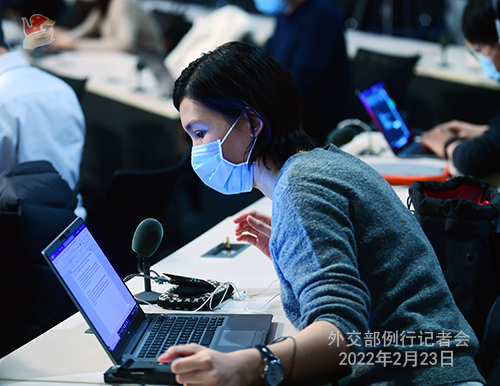
Reuters: China has said that the Minsk agreement is the only way out in resolving the Ukraine situation. But Russian President Putin has said that the Minsk agreement no longer exists. What is China’s comment on this?
Hua Chunying: The current situation in Ukraine is the result of various factors working together and has much to do with the long delay in the effective implementation of the Minsk-2 agreement. Even today, we still hope that relevant sides could exercise restraint, deescalate the situation through dialogue and consultation, and avoid further escalation.
Kyodo News: A follow-up on the statement by Japan’s Ministry of Foreign Affairs. Can you share the details with us? You mentioned the diplomat engaged in activities inconsistent with the individual’s capacity. What activities are you referring to exactly?
Hua Chunying: You’d better ask the Japanese Embassy in China what activities inconsistent with the capacity of a diplomat the individual concerned engaged in. We hope the Japanese side could properly discipline the behavior of its diplomats in China and prevent similar incidents from recurring in the future.
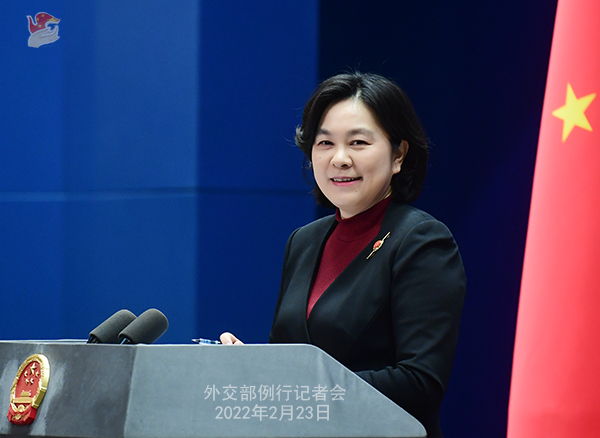
Fuji TV: The two spokesmen have been hosting the foreign ministry’s regular press conferences for a long while. Is there any special significance to your presence today? Also, I would like to mention that quite some time ago, my colleague reported how you misheard the name of the giant panda Xiang Xiang for Sugiyama. Again nice to see you here today.
Hua Chunying: Any special significance? (laughter) There seems to be none. I simply miss you guys so much.
I’d like to thank Fuji TV for getting me a big fan crowd in Japan. It was actually an embarrassing moment for me because I misheard the name. But, unexpectedly, it turned out to be a very heart-warming episode. Xiang Xiang is an ambassador of friendship between China and Japan. We are very glad that she has brought lots of joy to the Japanese people.
At present, despite some discordant and sometimes unpleasant noises in China-Japan relations, we have seen friendly interactions between the two peoples during the recently-concluded Winter Olympics. For example, figure skater Yuzuru Hanyu, who is very popular in Japan, is also warmly welcomed by the Chinese audience and has a huge fan base here, almost monopolizing trending topics every day. The story of young Chinese snowboarder Su Yiming and his Japanese coach Mr. Sato is also deeply moving and heart-warming. I think the story of their mutual trust, mutual support and joint success is a valuable source of warmth and positive energy in China-Japan relations. We really hope that more stories like these that bring warmth, light, hope and positive energy will be reported by Japanese media.

No comments:
Post a Comment